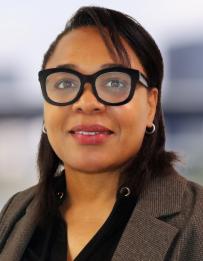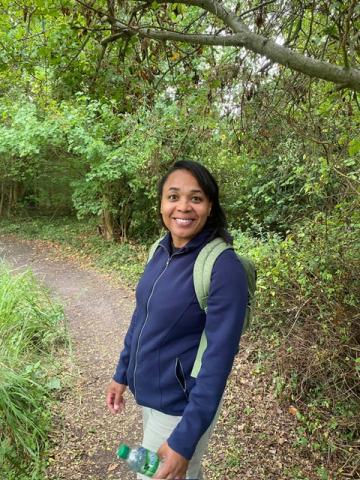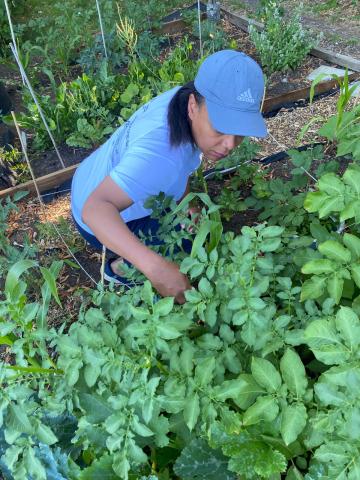Meet Dr. Maureen Paul
Chingford, England, U.K.

Numerophile. Changemaker. Sustainability advocate.
There are many ways to describe Dr. Maureen Paul, but none quite capture the positive impact of her influential career as a leading regulatory economist.
Maureen has worked across both public and private sectors, including a notable tenure in the U.K. Civil Service. Her résumé includes two of the Big Four consulting firms, the Competition Commission, the Office of Fair Trading, and Ofgem—the energy regulator for Great Britain.
Across these roles, one thread is clear: her superpower lies in analyzing and translating economic behavior to drive positive change for clients, communities and the planet.
From an early age, Maureen was determined to drive change that improves lives. Growing up in Dominica, a Caribbean island often hit by hurricanes, she witnessed firsthand the effects of climate change. By age 16, she knew she wanted to become an economist—not a doctor or lawyer—so she could use her fluency with numbers to make a difference.
Maureen has devoted her career to inspiring the next generation of economists and energy professionals to believe in their power to drive meaningful change. She has played a leading role in pioneering initiatives that open doors for individuals from diverse backgrounds—helping them aspire to careers they may never have considered. Notably, she was a core member of the trailblazer group behind the Civil Service’s first-ever economics apprenticeship, thereby introducing Ofgem’s first economics apprenticeship program (the only economic regulator to have had one at the time). Maureen also helped launch a mentoring program connecting Ofgem with students from Greenwich University.
Thanks in part to her work, the regulatory industry is now more effective at data collection, impact assessment, and inclusive economic policymaking.
“I’ve been privileged to lead regulatory change in the U.K., including creating new regulatory frameworks, which now influence how other countries approach regulation and climate actions.”
Get to know Maureen
-
65896
Population of Dominica, where Maureen grew up
-
11
Years at Ofgem, including five roles such as Chief Economist
-
2
Big Four consulting firms she has worked for
-
2020
Year she helped launch the first professional economic apprenticeship with the University of Greenwich
-
1
Ph.D. from the University of Warwick, earned in 2004, on “Economic Behaviour and Fairness Perceptions: A Microeconomic Analysis,” which informed Cabinet Office work on pay transparency and the gender pay gap
-
3
years as one of the first commissioners for the Caribbean Competition Commission
What inspired you to pursue a career in the energy transition and regulatory space?
It’s about making a lasting impact, not just for current generations, but for all future residents of the planet. I come from Dominica, a small island known as the ‘Nature Isle’ of the Caribbean. Growing up, hurricanes were a regular part of my life, but I noticed how much more vicious and frequent they’ve become. The devastation is much worse, and I’ve seen the economic toll of constant rebuilding and the loss of ecosystems and wildlife.
But I’ve also seen incredible solutions—like geothermal and solar energy—making a difference. That personal experience with climate change shaped my career path. I want to create positive change not only for Dominica but also globally. I’ve been privileged to lead regulatory change in the U.K., including creating new regulatory frameworks, which now influence how other countries approach regulation and climate actions.
How would you describe your personal motivation in your work?
Beyond climate action, I enjoy the strategic side of economic policy and regulation—making it more practical and equitable. I’m always asking: how can this work better for people, countries or organizations? How can we create economic policies that work in a way that is fair and inclusive? The energy sector presents many opportunities to rethink, reframe and innovate—I find that exciting. In economics, it is often thought that businesses are solely motivated by profit. However, what I have found: when businesses care about the impact of their decisions on communities and the countries they’re in, it drives long-term profitability and legitimacy.
What’s one piece of advice you’d give to young professionals entering the field?
Don’t be intimidated by complexity. That’s why I focus on speaking simply about the issues that affect us all. The younger generation is riding a wave of new technology, and they’ll help reshape how we work and think. Especially in energy, they’ll lead the charge. My message: your views carry weight, and you’ll help us, who are relatively “dinosaurs”, transform.
When you're not working, what are you doing?
Gardening. I’m no professional, but I love it—and I have an allotment. It’s hard work and time-consuming, but I’m committed to it. It’s a masterclass in turning theory into practice. You’ll make mistakes, but persistence is key. One day those cucumbers that never seemed to thrive will finally take root. You’ll discover the right method, the perfect patch of soil, and just the right spot for them to flourish.
Otherwise, I’m running, standing guard so my son does not spend too much time glued to his Xbox, or I’m watching horror movies. My favorite? Jeepers Creepers.
“Beyond climate action, I enjoy the strategic side of economic policy and regulation—making it more practical and equitable. I’m always asking: how can this work better for people, countries or organizations?”















































